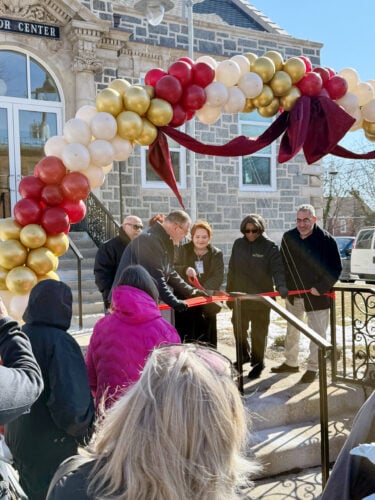Dark Chapter
Tour of Holocaust sites underscores important lessons to be taught, says Coumberland County teacher.


Prior to the new school year, Shawn Riggins relied on textbooks, lectures, slides and films to get across the salient features of a difficult subject he’s taught since 2016—the Holocaust. But the first two weeks in July turned his approach around. Riggins was one of 12 teachers from five states to tour Holocaust sites in Europe.
“This was my first time traveling to Germany and Poland … it was a very moving experience,” he says. “I thank the Jewish Foundation for the Righteous for organizing it and inviting me to participate.”
The Jewish Foundation for the Righteous (JFR) provides financial support to aged and needy non-Jews who rescued Jews during the Holocaust and preserves their legacy through a national education program.
The tour had an insightful impact on Riggin’s approach in the classroom, which will be put in play this coming school year at Cumberland County Technical Education Center (CCTEC), a full-time vocational high school.
“Having actually stood in the major sites of the Holocaust adds a layer that students can appreciate,” says Riggins, who teaches the year-long senior elective course, Human Rights and the Holocaust. “It is not just a photo from a textbook or online. I can tell students that I was there to bear witness to these locations, highlighting the importance for them to pass on what they have learned.
“Relaying the stories I heard from survivors and rescuers helps to show students the power their everyday choices can have. It is vital that students understand the power of their voices to shape history as it happens around them. At a time when antisemitism is on the rise and politicians flirt with fascist ideologies, it is more important than ever to learn the history of the Holocaust and the importance of standing up for human rights.”

Through lectures and visits to actual Holocaust sites, these educators gained a deeper understanding of the complex and tragic history of the Holocaust. The program is a high-level, intensive and immersive educational experience that included visits to concentration camps, ghetto sites and Holocaust memorials. Noted historian Robert Jan van Pelt, one of the world’s leading experts on the Holocaust, served as the accompanying scholar for the European Study Program.
Being able to travel with Professor Robert Jan van Pelt was incredible, Riggins says: “He has a wealth of knowledge and traveling with him to the actual sites of the Holocaust made the journey even more impactful.”
Through lectures and visits to actual sites, the cadre of educators gained a more profound understanding of the complex and tragic history of the Holocaust.
Riggins says touring one of “humanity’s darkest chapters underscored the importance of teaching our students about the Holocaust.”
The JFR hosted a luncheon for Holocaust rescuers at the POLIN Museum in Warsaw.

“Seeing the important work that Stanlee Stahl and the JFR do to help those who risked everything to save others had a major impact on my experience. Crossing the language barrier to speak with these rescuers stressed the importance of teaching students about doing the right thing,” he says.
Riggins interest in the Holocaust was born at Stockton University, a school with a large number of courses in the field of Holocaust studies.
“I interned as an undergraduate at Stockton’s Sara and Sam Schoffer Holocaust Resource Center where I was able to collaborate with a fantastic community of survivors, scholars, and fellow educators in this field,” Riggins says. “I also have the privilege of serving on the board of the South Jersey Holocaust Coalition where we engage educators and the public in many thought-provoking workshops.”
His course at CCTEC is partnered with Stockton’s Dual Credit Consortium, which enables students to connect not only with college-level material, but a network of peers interested in passing on what they have learned to create a hopefully more empathetic world, Riggins says.
More importantly, the stories of local survivors further his interest in teaching about the Holocaust. “Teaching in Cumberland County, it is important for students to recognize South Jersey as a place where many Holocaust survivors found a home,” he says.







